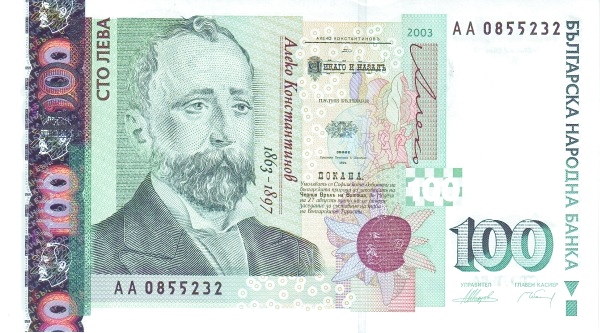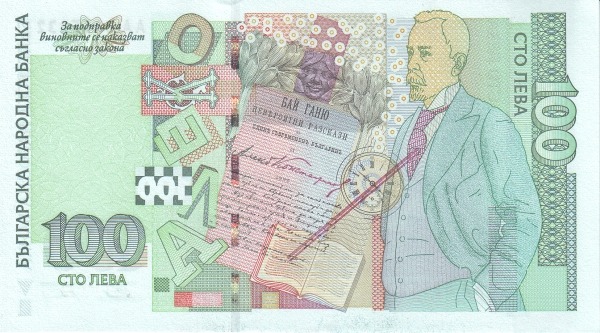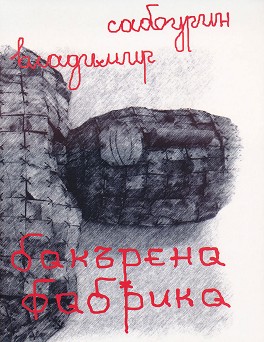As I have mentioned earlier, the Global Literature in Libraries Initiative is organizing a Bulgarian Literature Month in June, and I will be the editor of this event.
In the meantime, I have already commissioned quite a number of reviews and will also post one or two things myself. However, there are still a number of books that could be included, provided I find a reviewer (preferably a book blogger or someone else who is doing bookish things).
Here is a short list of books which – if you belong to the category mentioned above – are open still for reviewing during Bulgarian Literature Month:
Classics:
Ivan Vazov: Under the Yoke – the first Bulgarian novel, and until today read in school
Aleko Konstantinov: Bay Ganyo – not all Bulgarian love this book, because it is satirically exposing certain elements of the Bulgarian national character (just like not all Czechs love Schwejk!)
A modern classic:
Ivailo Petrov: Wolf Hunt –
Contemporary Bulgarian literature:
Virginia Zaharieva: 9 Rabbits
Albena Stambolova: Everything Happens As It Does
Angel Igov: A Short Tale of Shame
Zahary Karabashliev: 18% Gray
Hristo Karastoyanov: The Same Night Awaits Us All
Georgi Gospodinov: Natural Novel
Deyan Enev: Circus Bulgaria
Angel Wagenstein: Farewell, Shanghai
Bulgarian-born authors that write in another language:
Miroslav Penkov: East of the West
Miroslav Penkov: Stork Mountain
Kapka Kassabova: Street without a Name
Ilija Troyanow: Collector of the Worlds
Elias Canetti: The Tongue Set Free
Fiction by foreign authors but with a Bulgarian setting:
Will Buckingham: The Descent of the Lyre
Rana Dasgupta: Solo
Garth Greenwell: What Belongs to You
Elizabeth Kostova: The Shadow Land
Julian Barnes: The Porcupine
Non-fiction:
Dimana Trankova / Anthony Georgieff: A Guide to Jewish Bulgaria
Dimana Trankova / Anthony Georgieff: A Guide to Communist Bulgaria
Tzvetan Todorov: The Fragility of Goodness
Mary C. Neuburger: Balkan Smoke
Clive Leviev-Sawyer: Bulgaria: Politics and Protests in the 21st Century
The reviews need to be unpublished and preferably in English. Let me know if you are interested in reviewing a book on this list.
I have also a few giveaways. Those will be given preferably to those who commit themselves to write a review of the above mentioned titles. If you are interested in a giveaway (it should be reviewed too for Bulgarian Literature Month), please let me know until 29 April. If several people are interested in a giveaway, I will draw lots.
The giveaways:
Milen Ruskov: Thrown Into Nature – a novel by one of Bulgaria’s most acclaimed contemporary writers
Kerana Angelova: Elada Pinyo and Time – “The novel describes the myth of the person who travels through various wombs and embraces, undergoes multiple transformations due to the culture of times, yet never stops expressing the deep faith that above our earthly trials watches the law of love.”
Randall Baker: Bulgariana – diary of one of the founders of New Bulgarian University in Sofia; a fun read that gives a deep and sympathetic insight into the Bulgaria of the 21st Century
Nikolai Grozni: Claustrophobias – an autobiographical novel of an author that was a wunderkind pianist and a monk in an ashram in India, and a lot of other things
Ivailo Petrov: Before I was born – story collection of one of the most important post-WW II authors from Bulgaria (the book is antiquarian, but in very good condition)
Hristo Hristov: Kill the Wanderer – Hristov, an investigative journalist, describes the life and the assassination of Georgi Markov, a Bulgarian author and journalist, in London. Considering the recent news about Julia Kristeva, who was exposed as a collaborator of the Bulgarian State Security, it is important to not forget what this institution did to enemies of the system.
And now, let me know which book you want to review, and in which giveaway you are interested. (The winners will be informed individually and by a post here on 30 April.)
© Thomas Hübner and mytwostotinki.com, 2014-8. Unauthorized use and/or duplication of this material without expressed and written permission from this blog’s author and/or owner is strictly prohibited. Excerpts and links may be used, provided that full and clear credit is given to Thomas Hübner and mytwostotinki.com with appropriate and specific direction to the original content.










 Facebook
Facebook RSS
RSS Twitter
Twitter